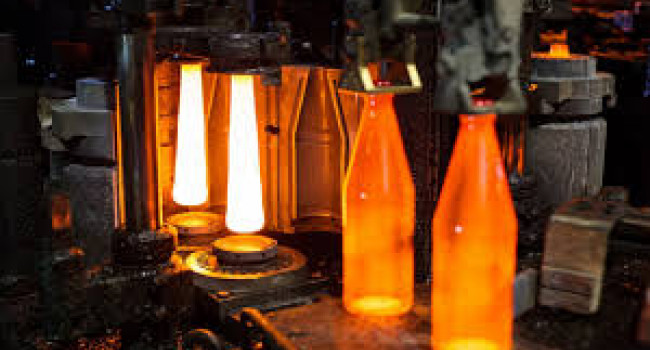Glass manufacturing in Saxony-Anhalt

The federal state of Saxony-Anhalt is both the cradle and German centre for the production of soda. Of the three production locations in Germany of the raw material which is indispensable for the production of glass, two are in the Salzland District of Saxony-Anhalt: in Staßfurt and in Bernburg. Here, the basic materials are available from which soda is made: salt, chalk and water. The production of soda not only has a history here that goes back 130 years, it also has a very promising future, since the reserves of potash and limestone here should last at least another 100 years, explains Mathias Hübner, Sales Director at Sodawerk Staßfurt GmbH & Co. KG which has been part of the Polish Ciech group since 2007. The Staßfurt soda works are able to source the basic materials of potash and limestone in the company's own stores just a few kilometres away from the production location. "The fact that the raw materials are on our doorstep is an important competitive advantage." It also substantiates the location of the Staßfurt soda works. Glass manufacturers make use of these benefits. Numerous glass manufacturers have settled in the area around the two soda works in Staßfurt and Bernburg. The entire value added chain for glass production is available in Saxony-Anhalt, from the starting materials of potash, lime, quartz sand and dolomite through to the glass manufacturers and refiners, through to the producers of the end-products. In this regard, the state is home to four sheet glass works alone, which produce a third of the sheet glass made in Germany and a tenth of that made in Europe. Container glass is produced by HNG Global GmbH in Gardelegen. Large quantities of sheet glass are processed as (solar-) float glass to make solar modules. Other companies make composite safety glass for cars and insulating glass and safety glass for a wide range of uses and applications. More than 80 glass companies in the state process glass for industrial buildings, private homes and public organizations. Among others, the Staßfurt soda works are at the beginning of this value added chain. They supply the glassworks with the high quality raw material which has been produced in the town on the river Bode since 1883. The mineral salt which is stored in the warehouses of the so-called 'Staßfurt Saddle' stands out due to its high levels of chemical and physical quality. The experience that has been gained and passed on over the decades, the high skill level of the approx. 430 employees and the good quality of the base materials all mean soda from Staßfurt has an excellent reputation in the world. The use of the base product of soda is wide-ranging. In the chemicals industry it can be used for the production of bleaching agents and fertilizers. It is used for the production of dyes, filling agents, industrial cleaners, catalysts and adhesives. It is also necessary for the production of washing agents and also in the food products industry. Currently, 560,000 tonnes are produced annually in Staßfurt. This represents a market share of 30 per cent in Germany, of which approx. 80 per cent goes into glass production. Although it mostly remains in Germany, soda from Staßfurt is also used in Denmark and Switzerland. "The most important thing in the production of soda is the security of supply," highlights Hübner. Glassworks operate 24 hours a day, 365 days a year. Technological reasons mean that the production should never be interrupted. This also applies to the Staßfurt soda works. And to prevent any outages from occurring, all the systems in Staßfurt have dual protection. This security of supply is something the glass manufacturers and processors value. Wolfram Seidensticker, Director of the Indian-owned container glass manufacturer HNG Global GmbH in Gardelegen justified the choice of location for his company due to the continuous availability of the raw materials and the immediate proximity of the soda producers. "This results in huge cost advantages for us," explains Seidensticker. "The Staßfurt soda is very high quality," says the glass specialist. To ensure things stay this way, several hundred million Euros have been invested in Staßfurt since its reprivatisation in 1993. All the systems have been completely modernised or rebuilt. Since 1995 an ultra modern industrial power plant with gas and steam turbines has been available to the company. Soda works are also optimistic for the future, as demand for glass and therefore the base material of soda is set to grow over the long term, irrespective of the ups and downs in the wider economy.